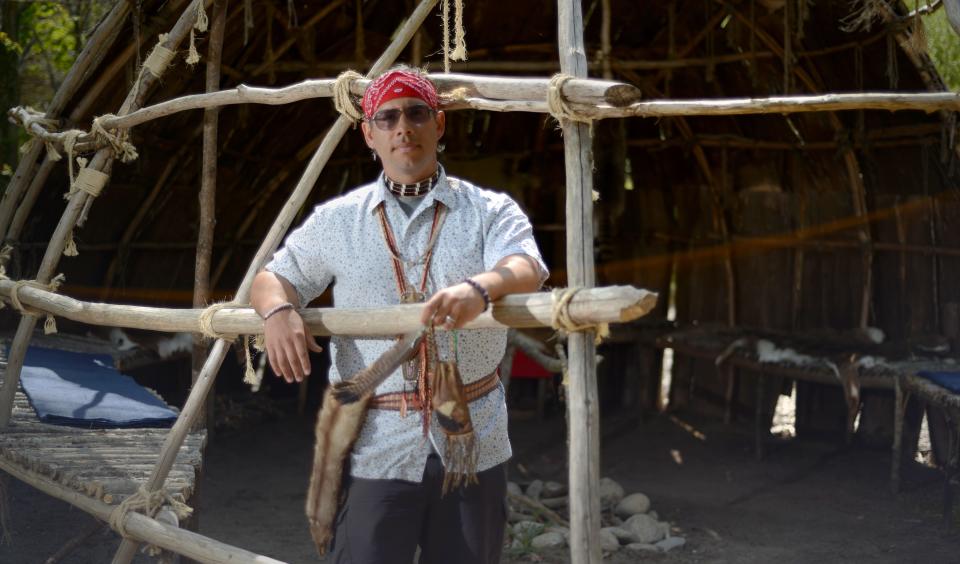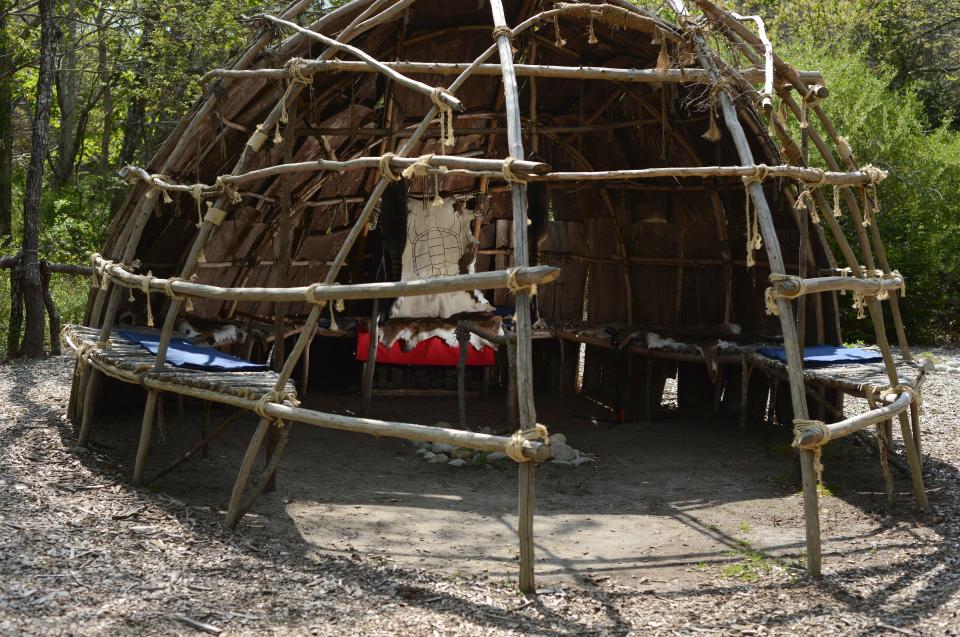Brewster: Is it cultural appreciation or appropriation? Wing Island tour raises question
EDITOR'S NOTE: A correction was made to this story on May 12, 2023, to eliminate an incorrect name of a walking tour guide in 2022 for the Brewster Historical Society.
YARMOUTH PORT — Marcus Hendricks has been carefully constructing Too'noopahs (turtle) Wet8 since 2020, out of smooth and slender branches of local white and red cedar; and chunks of tulip poplar bark, sourced from Connecticut by Annawon Weeden, a member of the Mashpee Wampanoag Tribe.
The traditional Wampanoag structure sits within the meadows of the Historical Society of Old Yarmouth, and is the result of a collaboration between Hendricks, a member of the Mashpee Wampanoag Tribe, and the Historical Society.
"There are groups throughout Cape and the state that treat Indigenous people fairly," said Hendricks, who is also of the Nipmuc Tribe. "But there are also places that steal our cultural knowledge, tokenize us, and profit off of us. We are fed up."

Should Indigenous information be shared by non-Native people?
Recently, Hendricks noticed that the Brewster Historical Society was holding "Wing Island Walk with Lee Roscoe and Sally Gunning." The outdoor walking tour, which will be held from 11 a.m. to 12:30 p.m. Saturday, was described on the Brewster Historical Society's Instagram page as an Indigenous peoples of Brewster Wing Island walk.
The Historical Society's website said Gunning and Roscoe will explore flora and fauna and Wing Island's history from pre-contact to the present. The tour will also cover early seasonal patterns of the Sauquatucket Tribe and later use by settlers.
In fall 2021, Gunning hired Hendricks to lead a similar walk, he said, where he shared Indigenous history of the land, and covered pre-contact tribal knowledge.
At that time, Historical Society members were charged $25, and non-members $30, according to the original event posting provided by Hendricks. The event sold out.
The success of the walk prompted Hendricks to contact Gunning in the spring of 2022 for another tour.
While Gunning acknowledged, in a recent phone interview with the Times, Hendricks' knowledge of Wampanoag history and traditions, and culturally sustainable foods, she said she didn't re-hire him in 2022 because his knowledge wasn't specific enough to Brewster. For the 2022 walking tour, a non-Native member of the Brewster Historical Society was hired, Gunning said.
For Hendricks, the slight stung, but he accepted Gunning's decision. Hendricks will instead lead "Wetu Walk and Talk: Pre-Contact Period-1800," through The Historical Society of Old Yarmouth, along with Bob Kelley at 2 p.m., May 20.
The Brewster walk did not feature any tribal members in 2022, or in Saturday's event, said Marcus Hendricks.
The problem with Gunning's plan, he said, is she didn't include any tribal members in the spring 2022 event or for Saturday's event. Proceeds, Hendricks said, should also be donated to an Indigenous organization.
"They use us once, steal our knowledge, and then don't invite us back," said Hendricks.
Gunning said she reached out to several Wampanoag tribal members by email, and no one responded.
"We don't want to be the white people telling the story but I sent emails saying outright what my timeline was," she said. "We tried. What else are we supposed to do? We gave everybody a good chance."
Gunning said Wampanoag perspectives are valid. But it's been her impression that Wampanoag people aren't well versed in Indigenous Lower Cape history.
Which is part of the reason why she partnered with Roscoe for the tour. Roscoe is non-Native, and recently published "Wampanoag Art for the Ages Traditional and Transitional." Roscoe has been vetted by Indigenous people, said Gunning.
"She (Roscoe) thinks of herself as a bridge between the two cultures," said Gunning.
Roscoe said she is an Indigenous ally and advocate.
A self-proclaimed Indigenous ally and advocate, Roscoe said she will be sharing information from her book during the walking tour, which features Wampanoag artists, including Hendricks.
"Marcus is just making trouble and I'm shocked and appalled," said Roscoe.
Throughout many decades, Roscoe said, she's made connections with Wampanoag people but it didn't occur to her to share her connections with Gunning.
"If the tribe feels I am violating their turf, I will withdraw," said Roscoe. "But not for Marcus' sake."
In emails sent to the Times, neither Roscoe nor Gunning have withdrawn from the tour. Instagram posts describing the tour were also altered on the Historical Society's page, said Gunning by email.
Is there a way to protect cultural property?
NaDaizja Bolling, a Gay Head (Aquinnah) Wampanoag tribal member, and director of the Aquinnah Cultural Center said Brewster is Wampanoag territory, and Wampanoag people should be sharing their own history on their own terms.
Bolling called the walking tour exploitative in nature, and said Indigenous history and contemporary perspectives are being extracted and sold, while simultaneously erasing a thriving Wampanoag community.
"We are capable of and work diligently to share our own histories," she said. "The Mashpee Wampanoag Indian Museum and Aquinnah Cultural Center are great places to start."
A lack of effort to include Indigenous voices is common, according to Pam Ellis, a Natick Nipmuc.
Pam Ellis, a Natick Nipmuc tribal member, said there's a reckoning among tribal people to bring real, Indigenous voices into spaces and narratives.
"This is about protecting cultural property of the tribes we come from," said Ellis, who is a traditional knowledge keeper and culture bearer for her tribe. "We are prioritizing our ability to contribute and make our voices heard."
For Ellis, the lack of effort to include Indigenous voices in a space like the Brewster Historical Society is common.
"They want to bring forward a more diverse and inclusive history, but interestingly enough we’re not there," she said. "That enables them to control the image of who they think we are."
Can cultural appropriation be legally checked?
Gail Hill, a member of the Mashpee Wampanoag Tribe and a commissioner for the Massachusetts Commission on Indian Affairs said Hendricks' story is all too common.
"We are proud of our culture and want to share knowledge and be appreciated. But Indigenous people need to be careful," she said. "Sometimes we are too trusting with our crafts, history and culture."

The commission, she said, has held lengthy discussion about legal solutions surrounding cultural appropriation.
"Marcus was exploited. He was ripped off," she said. "That's why we need to protect ourselves with contracts and waivers."
There’s a difference between cultural appropriation and cultural appreciation, said Hill. Unfortunately, members of the commission only see appropriation worsening in the future.
"This is just going to explode," she said. "And the only way to combat it is to expose it and bring it to the attention of tribal members, tribal councils and communities."
One thing that could help improve the situation, is to set up a Wampanoag scholarship account, which Native and non-Native organizations can contribute to. If groups like the Brewster Historical Society want to educate people on Indigenous culture, Hill said the tribe would be happy to accept a check.
"If you are so interested in educating people about our culture then you should be equally concerned about educating our tribal people about our own culture," she said.
Collaboration and cooperation is key.
The bottom line, said Ellis, is that organizations should be willing to collaborate in a respectful and dignified manner with indigenous people, before historical errors continue to be produced, adding to the colonial narrative.
"We are once again being denied the agency and autonomy and self determination as Indigenous people," she said. "I’m tired of a lot of the well meaning non-Native people rewriting history again from their perspective on us. It's the Colonial gaze all over again."
Rachael Devaney writes about community and culture. Reach her at rdevaney@capecodonline.com. Follow her on Twitter: @RachaelDevaney.
Thanks to our subscribers, who help make this coverage possible. If you are not a subscriber, please consider supporting quality local journalism with a Cape Cod Times subscription. Here are our subscription plans.
This article originally appeared on Cape Cod Times: History walk lacks Indigenous voices, Mashpee tribe member says

